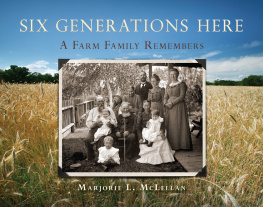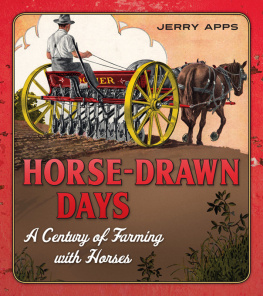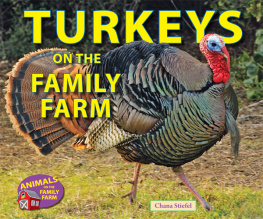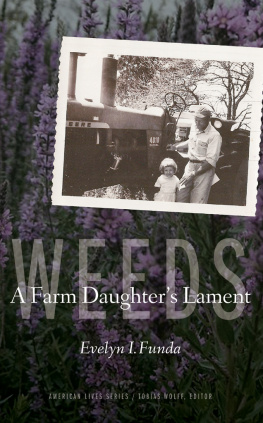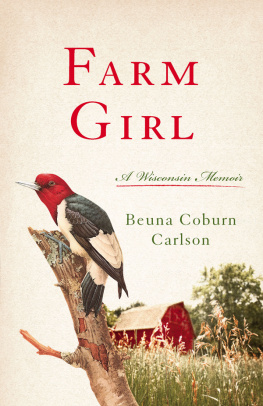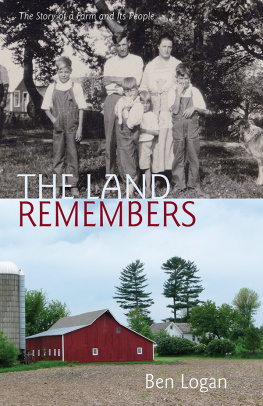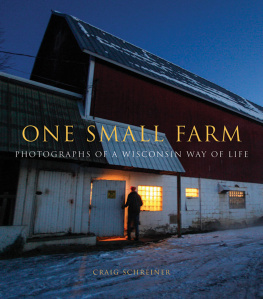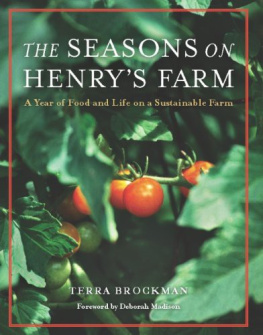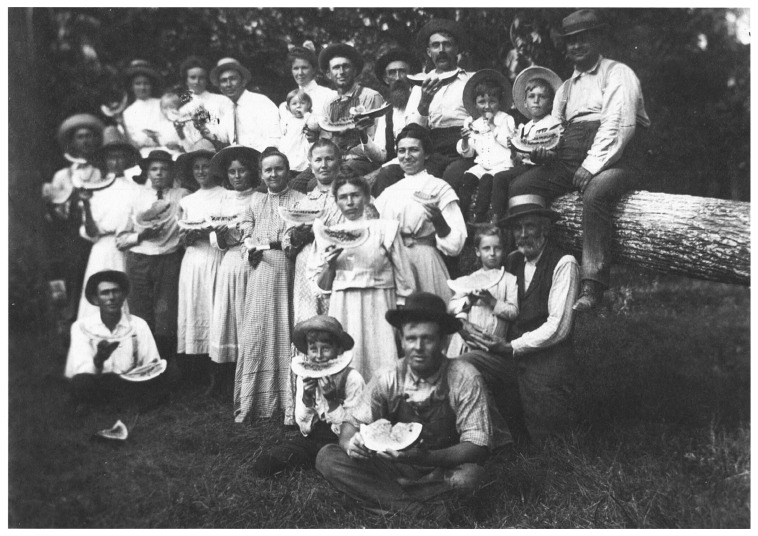
Rexford Kruegers snapshot of family on a visit to Iowa became a popular family postcard. Such group portraits recalled and reaffirmed family connections, shared experiences, humorous anecdotes, and family milestones and tragedies. WHi Lot 3994/62
Published by the Wisconsin Historical Society Press
Publishers since 1855
1997 by the State Historical Society of Wisconsin
Second printing 2013
E-book edition 2013
For permission to reuse material from Six Generations Here (ISBN 978-0-87020-283-4; e-book 978-0-87020-656-6), please access www.copyright.com or contact the Copyright Clearance Center, Inc. (CCC), 222 Rosewood Drive, Danvers, MA 01923, 978-750-8400. CCC is a not-for-profit organization that provides licenses and registration for a variety of users.
wisconsinhistory.org
Photographs identified with WHi or WHS are from the Societys collections; address requests to reproduce these photos to the Visual Materials Archivist at the Wisconsin Historical Society, 816 State Street, Madison, WI 53706.
Front cover: Four Generations of the Krueger family of rural Watertown, Wisconsin, 1900. The white-bearded patriarch William Krueger, who immigrated from Pomerania in 1851, is seated center, surrounded by members of his extended family. His eldest son, August, and his wife, Mary, hold their twin grandchildrenEdgar (left) and Jennie. Williams youngest son, Henry, is standing, while Henrys son, Rexford, sits on the grass in front of his second cousins. Next to Henry stands the twins mother, Flora, and her sister-in-law, Sarah. Williams third wife, Johanna, stands behind his chair, while Williams son-in-law, Charles Goetsch (married to August and Henrys sister, Minnie), sits to her right. Missing from this genealogical family portrait is the twins father, Alex Krueger, who photographed this family group as well as most of the family pictures contained in this book. WHi 2008
Cover design by Sara DeHaan
17 16 15 14 13 2 3 4 5 6
The Library of Congress has cataloged the printed edition as follows:
McLellan, Marjorie L.
Six generations here: a farm family remembers/by Marjorie L. McLellan: with an essay by Kathleen Neils Conzen.
Includes bibliographical references.
1. Rural familiesWisconsinDodge CountyCase studies. 2. GermansWisconsinDodge CountyCase studies. 3. Family farmsWisconsinDodge CountyCase studies. 4. Dodge County (Wisconsin)Rural conditions. I. Conzen, Kathleen Neils. II. Title.
HQ536.15.W6M35 1996 306.8520977582dc20 9537595
ISBN 0-87020-283-9 (paperbound).
Alternative Cataloging-in-Publication Data
McLellan, Marjorie L.
Six generations here: a farm family remembers. By Marjorie L. McLellan, with an essay by Kathleen Neils Conzen. Madison, WI: State Historical Society of Wisconsin, copyright 1997.
Illustrated with 164 photos.
Partial Contents: Gathering the family history.The Kruegers: farm and family.Photography and autobiography. Meaning in family photographs. Postcards.Immigrant stories: family and memory.
1. Krueger Family. 2. Rural familiesDodge County, WisconsinHistory. 3. Family farmsDodge County, WisconsinHistory. 4. German-American familiesDodge County, WisconsinHistory. 5. Family chronicles, German-AmericanWisconsin. 6. Pomeranian immigrantsDodge County, WisconsinHistory. 7. Dairy farmsDodge County, WisconsinHistory. 8. Photography of families. 9. German-American familiesDodge County, WisconsinPictorial works. 10. Rural familiesDodge County, WisconsinPictorial works. 11. Family farms-Dodge County, WisconsinPictorial works. 12. Dodge County, WisconsinSocial life and customsPictorial works. 13. German-American dairy farmersDodge County, WisconsinHistory. I. Conzen, Kathleen Neils. II. State Historical Society of Wisconsin. III. Title. IV. Title: Farm family remembers. V. Title: Here six generations.
301.45131 or 921 or 977.582
Alternative CIP prepared by Sanford Berman, Head Cataloger, at Hennepin County Library, Edina, Minnesota.
First printing supported by the National Endowment for the Humanities.
FOREWORD
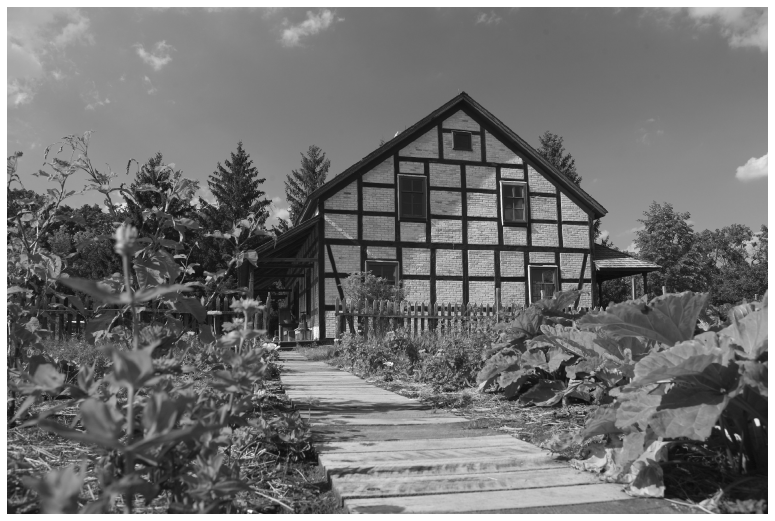
Old World Wisconsins reconstruction of the Koepsell farmhouse, seen here, was guided by the photographs and records of the Krueger family, who shared a similar Pomeranian heritage. Photo by Old World Wisconsin.
In 2012, Old World Wisconsin unveiled a new interactive and immersive experience designed to give guests a firsthand encounter with farm life in 1880s Wisconsin. Simply called Life on the Farm, the new program is staged on a reconstructed German American family farmstead that includes the relocated and restored Washington County home of Friedrich and Sophia Koepsell. To participate in the program, Old World Wisconsin guests select from six possible personas, each one representing a member of the extended Krueger family, the subject of Six Generations Here. Guests can then pick from a distinct list of chores to perform based on the age and gender of the family member in 1880. By becoming, if only for a short time, eighteen-year-old Hannah Goetsch or thirty-five-year-old August Krueger and undertaking the tasks they might have performed on their late nineteenth-century farmdonning wooden barn shoes and checking for eggs, splitting wood into stove kindling and using a hand-cranked mill to crack corn for chicken feedvisitors from the twenty-first century can connect to a person, time, and place from our past in a unique and memorable way. Life on the Farm inspires a sense of curiosity about farm life in nineteenth-century Wisconsin and creates a desire to learn more. This book, Six Generations Here, was an invaluable resource for developing the program and now serves as a companion to the Old World Wisconsin experience, providing an opportunity for guests to dive deeper and extend learning beyond their initial hands-on activities.
When Life on the Farm program designers were working to create portals through which Old World Wisconsin guests could access the past, they naturally turned to the Krueger family, who shared a similar Pomeranian heritage and agricultural pursuits with the Koepsells. The same photographs taken by Alex Krueger and his cousins that appear in Six Generations Here helped guide the initial reconstruction of the Koepsell farmhouse and surrounding farmstead landscape in the 1970s. It was then that author Marjorie McLellan, working as an intern on the Old World Wisconsin project in 1976, was first introduced to the Krueger family photos and the stories they represented. McLellans study of the photographs was augmented by oral histories that placed the images within a fascinating family story. Ultimately, the photographs, family narratives, and the authors extensive research on the Kruegers and their world culminated in this book.
In the following pages, Marjorie McLellan pieces together select examples from Krueger family stories and photographs, now preserved at the Wisconsin Historical Society, filling in any gaps in understanding with her own careful historicalresearch and well-crafted text. She opens the doors to multiple generations of this one family, not because of their notable contributions to American history, but due to the familiarity of their stories to other families in other places as they struggled to cope with change and to create a shared sense of who they were and where they came from. Kathleen Neils Conzens chapter complements McLellans work, providing further context on German immigration and settlement in nineteenth-century Wisconsin.

